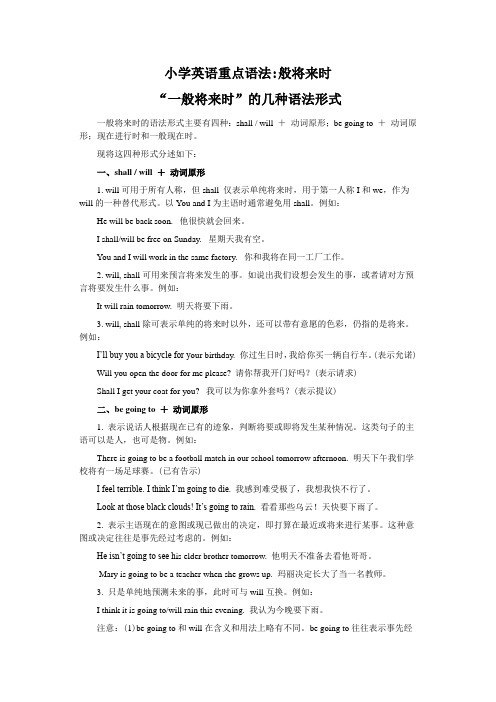小学英语一般将来时
- 格式:doc
- 大小:23.00 KB
- 文档页数:2

小学英语重点语法:般将来时“一般将来时”的几种语法形式一般将来时的语法形式主要有四种:shall / will +动词原形;be going to +动词原形;现在进行时和一般现在时。
现将这四种形式分述如下:一、shall / will +动词原形1. will可用于所有人称,但shall 仅表示单纯将来时,用于第一人称I和we,作为will的一种替代形式。
以You and I为主语时通常避免用shall。
例如:He will be back soon. 他很快就会回来。
I shall/will be free on Sunday. 星期天我有空。
You and I will work in the same factory. 你和我将在同一工厂工作。
2. will, shall可用来预言将来发生的事。
如说出我们设想会发生的事,或者请对方预言将要发生什么事。
例如:It will rain tomorrow. 明天将要下雨。
3. will, shall除可表示单纯的将来时以外,还可以带有意愿的色彩,仍指的是将来。
例如:I’ll buy you a bicycle for y our birthday. 你过生日时,我给你买一辆自行车。
(表示允诺)Will you open the door for me please? 请你帮我开门好吗?(表示请求)Shall I get your coat for you? 我可以为你拿外套吗?(表示提议)二、be going to +动词原形1. 表示说话人根据现在已有的迹象,判断将要或即将发生某种情况。
这类句子的主语可以是人,也可是物。
例如:There is going to be a football match in our school tomorrow afternoon. 明天下午我们学校将有一场足球赛。
(已有告示)I feel terrible. I think I’m going to die. 我感到难受极了,我想我快不行了。


小学英语一般将来时练习题 1.My brother is going to Shanghai next week. 2.Mary will see her grandfather tomorrow. 3.David will fly kites in the park this weekend. 4.I will make a plan for English study in three days. 5.Who is going to learn a new song next Tuesday? 6.Are you going to Beijing tomorrow? 7.We will not be having lunch at 12:00 tomorrow. 8.Where are you leaving for tomorrow? 9.Will Tom have a P.E。lesson next Monday? 10.What will they watch in the gym tomorrow? 11.What will they do tomorrow? 12.The boy will not have an English lesson tomorrow. 13.Will you be learning Chinese next week? 14.I will arrive there tomorrow. 15.Mike will not watch a movie tomorrow.
二.选择填空 1.(C) She is going to listen to music after school. 2.(A) We will be in Beijing in two days. 3.The students will make dumplings tomorrow. 4.Are you going to be thirteen years old next year? 5.Who will see a play in 5 days? 6.Mary will learn English next year. 7.He’ll go shopping this afternoon. 8.Will you meet at the bus。at 10:30? 9.Lily and I are going to play the guitar next week. 10.How is Jenny going home tomorrow? 11.Who is going to sing a song? 12.I will arrive in Beijing in three days. 13.He will make some model planes tomorrow. 1.My sister is going to play with her toy. 2.Who will play basketball? 3.Tom and Ann will buy some clothes. 4.What are you going to do at home next Saturday? 5.Is Lynn going fishing with you tomorrow? 6.Li Ming's friend is going to sing a song tomorrow. 7.My mother will make a cake for my birthday. 8.He will write a letter to his mother. 9.You are going to fly a kite tomorrow. 10.His sister turned five years old last year. 11.Li Ming's brother is going to skip tomorrow. 12.He is going to learn Chinese next year. 13.My father will make supper this evening. home tonight。改为:Li Ming plans to do his homework at home tonight. 12.My sister and I went to the park yesterday。改为:Yesterday。my sister and I visited the park. 13.The teacher gave us a lot of homework。改为:We received a considerable amount of homework from our teacher. 14.改为:The students had a lesson last year. 15.改为:I will go swimming with my mother.

小学英语一般将来时讲解和练习题-CAL-FENGHAI.-(YICAI)-Company One1一般将来时讲解及练习一、一般将来时的定义:一般将来时表示在将来时间将要发生的动作或存在的状态.与表示将来的时间连用。
tomorrow, next day(week, month, year…),soon, the day after tomorrow(后天)等。
如:She will visit Shanghai tomorrow.二、一般将来时的构成1.一般将来时有两种构成形式:(1)主语+shall/will+do(2)主语+ be going to + do 在表示“打算到某地去时”由于谓语动词go与going重复.一般可以只说be going to a place。
三、一般将来时的用法1.(1)主语+shall/will+do (will可用于所有人称.shall只用于第一人称I和we) 这种结构不是表示自己的打算、意图或计划.而是表示未来的事实或对将来的预测等如:No one will do heavy work.Roberts will do everything for us.(2)主语+ be going to + do这种结构常用来表达自己打算做某事、计划做某事或者有意做某事。
注意:be 动词要与主语的人称和数一致.如:I am going to do some reading tomorrow.He is going to have a piano lesson next week.We are going to have a party this Friday.2.通常情况下will 和 be going to能互换.但是be going to 与will 用法的也是有点区别的(1)只用will不用be going to的情况:①表示对未来时间与年龄的推测时.如:Tomorrow will be Monday.She will be thirteen next year.②表示必然发生时,如:Fish will die without water.People will die if all green plants die.(2)只用be going to而不用will的情况:如果表示已有迹象表明在不久的将来要发生的事情时.如:Look at those black clouds, It’s going to rain.3.某些动词如:go/come/leave/start/begin/arrive等.它们的现在进行时可以表示将来时.如:They are leaving for Shanghai tomorrow.My brother is coming here soon.四、一般将来时的句式变换肯定句:主语+shall/will+do主语+ be going to + do否定句:主语+shall/will+not+do(will not 可缩写成won’t)主语+ be+ not+ going to +do一般疑问句:shall/will+主语+ dobe+主语+going to+do特殊疑问句:疑问词+ shall/will+主语+do疑问词+be+主语+going to+do一般将来时练习题:一、用单词的适当形式填空。

小学一般将来时知识点总结引言小学英语是孩子们学习英语的起点,学好小学英语对以后的学习起到重要的基础作用。
其中,学习一般将来时是非常重要的一部分。
掌握一般将来时的用法可以帮助孩子们表达将要发生的事情,培养他们的语言表达能力。
本文将总结小学一般将来时的知识点。
一般将来时的定义一般将来时表示将要发生的动作或存在的状态。
它通常用于描述将来的事件、习惯或计划等。
一般将来时的构成一般将来时由助动词“will”和动词原形构成。
通常,在句子中,助动词“will”位于主语之后,动词原形位于助动词之后。
例如:•I will go to the park tomorrow.•She will eat dinner at home tonight.一般将来时的用法表示将要发生的事情一般将来时通常用于表示将来要发生的事情。
例如:•I will visit my grandparents next week.•We will have a party on Saturday.表示将来的打算或意愿一般将来时还可以用于表示将来的打算或意愿。
例如:•Tom will study hard to pass the exam.•They will help the homeless people.表示将来的预测有时,一般将来时也可以用于表示将来的预测。
例如:•It will rain tomorrow.•She will become a famous singer in the future.表示意见或推断一般将来时还可以用于表示意见或推断。
例如:•I think he will be successful in his career.•They believe the team will win the game.表示习惯或常态一般将来时还可以用于表示习惯或常态。
例如:•They will usually go for a walk after dinner.•He will always help his classmates.一般将来时的注意事项在使用一般将来时时,有一些需要注意的事项。

小学英语一般将来时讲解及练习一、一般将来时的定义:一般将来时表示在将来时间将要发生的动作或存在的状态,与表示将来的时间连用。
tomorrow, next day(week, month, year…),soon, the day after tomorrow(后天)等。
如:She will visit Shanghai tomorrow.二、一般将来时的构成1.一般将来时有两种构成形式:(1)主语+shall/will+do(2)主语+ be going to + do 在表示“打算到某地去时”由于谓语动词go与going重复,一般可以只说be going to a place。
三、一般将来时的用法1.(1)主语+shall/will+do (will可用于所有人称,shall只用于第一人称I和we) 这种结构不是表示自己的打算、意图或计划,而是表示未来的事实或对将来的预测等如:No one will do heavy work.Roberts will do everything for us.(2)主语+ be going to + do这种结构常用来表达自己打算做某事、计划做某事或者有意做某事。
注意:be 动词要与主语的人称和数一致,如:I am going to do some reading tomorrow.He is going to have a piano lesson next week.We are going to have a party this Friday.2.通常情况下will 和 be going to能互换,但是be going to 与will用法的也是有点区别的(1)只用will不用be going to的情况:①表示对未来时间与年龄的推测时,如:Tomorrow will be Monday.She will be thirteen next year.②表示必然发生时,如:Fish will die without water.People will die if all green plants die.(2)只用be going to而不用will的情况:如果表示已有迹象表明在不久的将来要发生的事情时,如:Look at those black clouds, It’s going to rain.3.某些动词如:go/come/leave/start/begin/arrive等,它们的现在进行时可以表示将来时,如:They are leaving for Shanghaitomorrow.My brother is coming here soon.四、一般将来时的句式变换肯定句:主语+shall/will+do主语+ be going to + do否定句:主语+shall/will+not+do(will not 可缩写成won’t)主语+ be+ not+ going to +do一般疑问句:shall/will+主语+ dobe+主语+going to+do特殊疑问句:疑问词+ shall/will+主语+do疑问词+be+主语+going to+do一般将来时练习题:一、用单词的适当形式填空。
小学英语一般将来时练习题及答案小学英语一般将来时练习题及答案begoingto=will翻译为“将;将要”一、概念:表示将要发生的动作或存在的状态句中一般有以下时间状语:tonight,inthefuture,tomorrow,ne某tday,oon,thedayaftertomorrow,thimorning,thiafternoon二、基本结构:①主语+begoingto+do;②主语+will+do.三、否定句:在①be动词后加not.I’mgoingtohaveapicnicthiafternoon.→I’mnotgoingtohaveapicn icthiafternoon.四、对划线部分提问。
一般情况,一般将来时的对划线部分有三种情况。
1.问人WhomgoingtogotoNewYorkoon.→WhoigoingtogotoNewYorkoon.问干什么Whatdo.→Whatiyourfathergoingtodowithyouthiafternoon3.问什么时候Whe n.→Whenihegoingtogotobed五、同义句:begoingto=will一、完成句子。
1.我打算明天和朋友去野炊。
I_____________________haveapicnicwithmyfriend.=I________have apicnicwithmyfriend..下个星期一你打算去干嘛我想去打篮球。
What___________________________________________ne某tMondayI__________________playbaketball.=What_________youdone某tMondayI________playbaketball.二、选择答案。
1.-Iamgoing____mygrandmotherandgrandfather.A.viitB.toviitC.viiting. What____youwanttobeA.areB.doeC.do.---________________----I’mgoingtotheciencemueum.A.WhatareyougoingtodothiafternoonB.Wha tareyoudoing4.----________________------Onfoot.A.DoyougotochoolbybikeeverydayB.Howdoyougotochooleveryday,Helen5.-----__________.-----Iuuallyreadbook.A.WhatareyoudoingB.Whatdoyoudointheevening三、选择填空。
完整版)小学英语一般将来时讲解及练习XXX: XXX XXXThe simple XXX future。
and it is used with time XXX。
next day/week/month/year。
soon。
and the day after tomorrow。
For example。
"She will visit XXX."There are two forms of the simple future XXX:1.Subject + shall/will + verb2.Subject + be going to + verbXXX to go to a place。
it is common to use "be going to a place" instead of repeating the verb "go."XXX simple future XXX can be used in the following ways:1.(1) Subject + shall/will + verb (will can be used for all persons。
while shall is only used for the first person singular and plural) is not used to express one's own plans or ns。
but rather tostate XXX。
such as "No one will do heavy work" and "Roberts will do everything for us."2) Subject + be going to + verb is often used to express one's own plans。
小学英语一般将来时
一、概念:表示将要发生的动作或存在的状态及打算、计划
或准备做某事。句中一般有以下时间状语:tomorrow, next
day(week, month, year…),soon, the day after tomorrow(后
天)等。
二、基本结构:
①be going to + do;
②will+ do.
三、否定句:在be动词(am, is, are)l后加not或情态
动词will后加not成won't。
例如:I'm going to have a picnic this afternoon.→ I'm
not going to have a picnic this afternoon.
四、一般疑问句: be或will提到句首,some改为any, and
改为or,第一二人称互换。
例如:We are going to go on an outing this weekend. →
Are you going to go on an outing this weekend?
五、对划线部分提问。一般情况,一般将来时的对划线部分
有三种情况。
1. 问人。Who 例如:I'm going to New York soon. →Who's
going to New York soon.
2. 问干什么。What … do.例如: My father is going to
watch a race with me this afternoon. →What is your father
going to do with you this afternoon.
3. 问什么时候。When.例如:She's going to go to bed at
nine. →When is she going to bed?
六、同义句:be going to = will
I am going to go swimming tomorrow(明天). = I will
go swimming tomorrow.